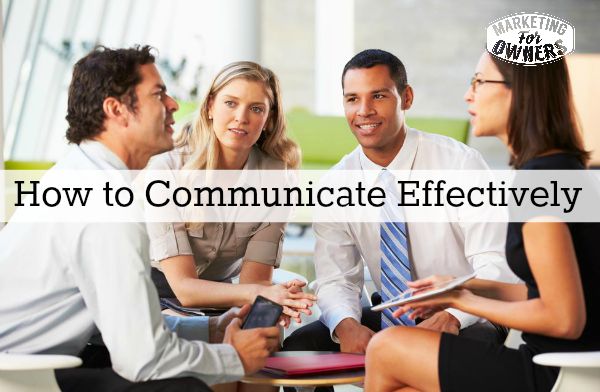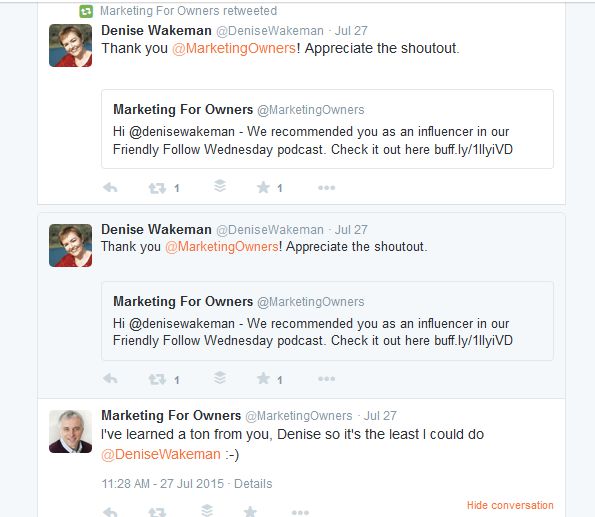
There’s no doubt about it: communication is probably the most important skill every business owner-slash-marketer needs. It’s importance can’t be overstated. Yet it’s one thing many entrepreneurs (maybe you) struggle with.
You can pay big bucks for good communication with potential customers. It will be worth it, too. But you don’t always have to invest money in communication. If you can communicate effectively yourself, you’re ahead of the pack.
How many times have you met someone with an amazing idea or business model who couldn’t effectively communicate to potential customers how their business can improve their life?
[show_to accesslevel=’free’]
In competitive industries — and every industry is competitive — those are the entrepreneurs who will struggle to succeed. So, what if you are the one who struggles to communicate effectively? Are you doomed to failure without investing a lot to have someone else communicate for you?
Not at all — but you do need to develop strong communication skills, both face-to-face and online.
Effective communication doesn’t just get people’s attention, it moves them to take action. It could be purchasing a product or service, visiting a website, setting up a meeting, funding your project, or any of the many things your business depends on.
Ideally, you will have already started to lay the groundwork for effective communication (whether you realize it or not), but it’s never too late start taking control.
The Groundwork
Show yourself to be reliable and trustworthy in your public communications (ie social media). Help others as frequently as you can, and never ignore customers who come to you in a public space, whether it’s a Facebook comment, a tweet, or a comment on a blog post.

The way you deal with people on social media goes a long way in building up trust, and it’s just a good way to do business.
Conversely, the way you deal with public communication can reduce the public’s confidence in you. Say, for example, you receive a critical tweet or poor feedback on an online merchant platform.
The less professionally you react — responding angrily, name-calling, etc. — the less people will want it communicate with you even in a positive situation.
Of course, there are people who will never see what you’ve done to build confidence in yourself online. That’s OK, because the building itself is effective communication.
Offer More Than You Ask For
When your call-to-action involves asking people to do something for you, such as giving you their information, always offer them something of more value.
eBooks are commonly offered in exchange for contact information, and for good reason — they have value, and can be distributed to any number of people without adding expense.
It also gives people a taste of what you offer, encouraging them to take a next step, such as purchasing a full book or signing up for a seminar.
If you think about the businesses you come into contact with yourself every day, from music or television streaming services to professional software to apps for your phone, nearly all offer something for (almost) nothing to get you interested, whether it’s a 30-day free trial or a demo version.
There’s a reason for that: when they offer you more than they receive in the beginning, they build your trust.
If an eBook or free trial is beyond what you’re able to offer, try a discount, a coupon, or a newsletter with exclusive content and/or deals. All of these things motivate action.
Clarity
This should go without saying, but clarity is one of the most important aspects of communication. You can’t expect people to take action if they don’t understand exactly what you’re asking of them.
You should also be as transparent as possible. If you’re asking people to sign up for something, for example, tell them what they can expect, and how often.
Will they receive emails weekly? What kind of information will the emails contain? Can they expect special perks, such as exclusive content or discounts?
Will you only use their email address for the newsletter? If it’s not clear, you lose potential customers.

If you’re giving away something for free, such as a download or ebook, be clear about what you’re getting from them (usually an email address so you can contact them about whatever it is you do).
Be clear that nothing more is expected — they’re not being subscribed to a monthly ebook service that will cost them money in the future.
Unless, of course, they are. In which case, you sell the benefits of the subscription and explain clearly what it will entail.
Empathy
No matter what you’re selling — information, products, a service — you’re helping your customers solve a problem.
Put yourself in the place of the people you are communicating with. What are the frustrations attached to not having the benefits your business can provide?
This shouldn’t be too difficult — there is a reason you chose your type of business, after all. Before you started your business, did you spend time looking for the service or product you offer? What did you find lacking that your business fulfills?
When you see things from the point-of-view of your potential customers, you become more aware of their needs. It’s possible you can offer them something they’re not actively looking for, but that you know would make their lives easier.
A lack of empathy makes your communication seem self-serving. Always look at what you do in terms of how you can help people, and they will respond.
Follow Up On Your Promises
Words have meaning. If you promise that someone will achieve something within a specified amount of time, you’d better be prepared to refund people some of the time. Following through will establish you as trustworthy.
But, in general, you shouldn’t make claims you can’t 100% back up in the first place. What you offer has value. express to people what that value is.
A promise of success (and, of course, you can’t realistically promise that) has no value. What does have value is your expertise, your experience, and your track record.
Continued Engagement
You’ve gotten people to answer your call to action. Great! Now you have to maintain communication in order to build the relationship.
Remember the groundwork you laid on social media to show how reliable you are? That wasn’t just laying groundwork. It was the start of a continued engagement.
Stay active — and interactive — on social media every day (3-4 times a week at minimum). Engage with your followers, listen to what they have to say, be responsive. When your next call to action comes around, they’ll be likely to be responsive to you, too.
By contrast, if you log on to Twitter only when you want something, don’t expect much in the way of response. That’s not effective communication.
In addition to social media, you should keep up with communication (with their permission) by email. Some businesses still find snail mail to be effective, especially if they sell products.
Whatever methods you choose, don’t reel them in an them and then drop them. Communication is an ongoing process.
When it comes to communication and your business, what works for you? Share your tips in the comments.
[/show_to]
[hide_from visible_to=’public’]
Sorry, access to this special content
is for ‘Owners’ only
Owners log in
here
Not a member of
the Owners Club yet?
[/hide_from]
